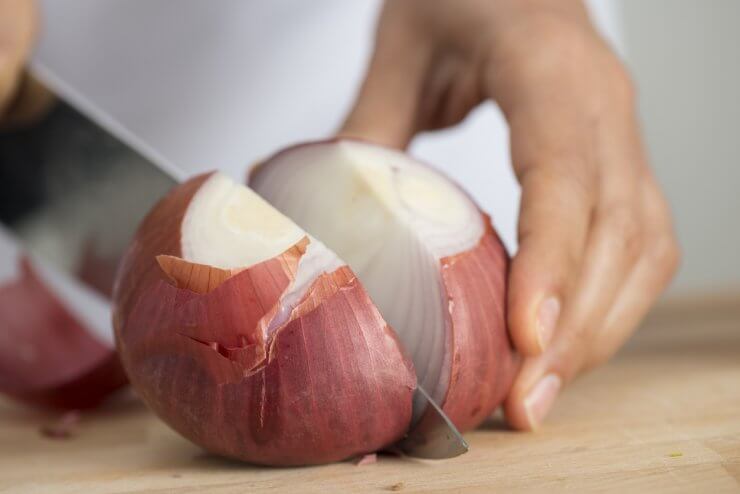
Chopping an onion
Practical Applications for Onions
Onions are great to eat; no argument there. But did you know that they can help you solve some practical problems?
In the winter, if your windshield is iced over, try slicing a large yellow onion in half. Rub the raw side over the glass and it will help clear the ice off. It’s the juices in the onion that do the trick.
In the summer, use a cut onion to give your grill a final polish before you put on the first burger of the season. Again, it’s the juices from the onion that will help clean off the last of last season’s icky sticky stuff.
Since ancient times, onions have been used for their health properties, as well as a food source. Throughout history, people have used onions for their antiseptic and antifungal properties to treat wounds, reduce the severity of colds, as well as to restore courage to soldiers in battle. Is there anything the onion can’t do?
Folklore praises onions’ ability to chase off evil spirits, including vampires. A Turkish legend says that when Satan was banished from heaven and landed on Earth, garlic sprouted from where his left foot landed, and onions sprouted from his right footprint. There’s a place in Turkey called Devil’s Table that claims to preserve the devil’s first footprints.
You may have heard that cut onions are poisonous, that they’re bacteria magnets. In fact, onions have very strong anti-microbial properties, so they’ll fight bacteria rather than attract it. Leftover raw onions will keep in the fridge for up to a week.
More recently, studies have associated consumption of onions with protection against osteoporosis, heart disease, diabetes, cancer, obesity, arthritis, and other conditions and may even provide anti-aging effects.
Heart Health
Onions have a reputation for helping to prevent cardiovascular disease; they lower the risk of blood clots. Among the antioxidants in onions, studies have shown that quercetin, which occurs in high levels in onions, protects against heart disease with its anti-inflammatory properties. The organosulfur compounds in onions also contribute to heart health.
Cancer Prevention
Studies indicate that onions may help decrease the incidence of stomach and colon cancer. Quercetin features prominently in its tendency to protect against the development of cancer. Organosulfur compounds are believed to inhibit the development of cancer in the gastrointestinal tract and in mammary glands.
Quiet a Cough
A lot of times, you need to take some of those old-fashioned home remedies with a grain of salt. But a natural cough syrup recipe comes with scientific support. Both onions and honey have natural antimicrobial properties. The ancient Romans rubbed cut onions on injuries and honey has long been used to help treat coughs.
To make your own natural cough syrup, chop a sweet onion and put it in a pan; cover the onion with a half cup of honey. Heat the honey and onions on very low heat for about 20 minutes. Don’t heat the honey higher than 118 degrees F. Pour the mixture through a strainer into a bowl; press down on the remaining onions to extract more of that antimicrobial juice.
For adults, take 1 tablespoon every couple of hours to treat a cough; for children a year old and up, use a teaspoon. Never give raw honey to babies under a year old. Pour your homemade cough syrup into a jar and keep in the fridge so you have your home remedy handy.
If you want to give your homemade cough syrup an extra antimicrobial kick, you can add a few cloves of garlic to the mix; garlic has antimicrobial properties, too. And if you want to skip the stove, just put all the components into a covered glass bowl and let the mixture steep for a few hours.
Additional benefits of onions
The fiber and manganese in onions help contribute to bone growth. One study suggests that eating onions can help reduce your risk of osteoporosis. Another study indicates that eating onions can help prevent gastric ulcers by snagging free radicals and prevent the growth of a particular ulcer-causing microorganism.
Bottom Line
While some further medical studies might be required to confirm the health benefits of onions, eating your own home-grown varieties is a great way to control what you eat and ensure a healthier diet.
Did you know that onions can be so healthful? Please tell us about healthy ways you use onions.



